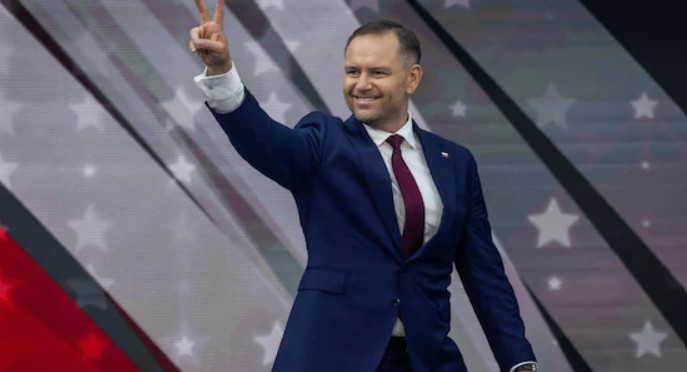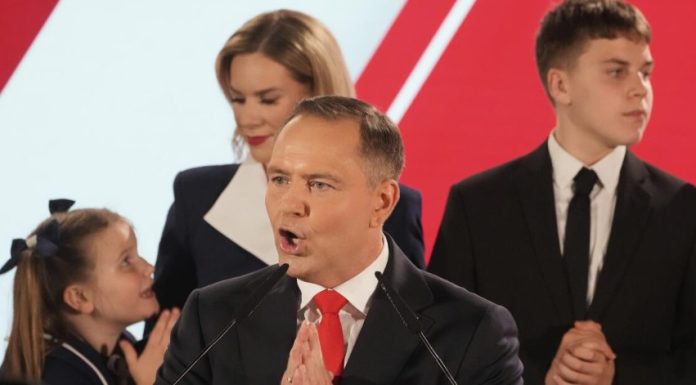In a stunning upset that has sent reverberations across Europe and beyond, Karol Nawrocki, the conservative historian and former amateur boxer, has narrowly claimed victory in Poland’s fiercely contested presidential race. His win, solidified in a razor-thin run-off on Sunday, June 1, 2025, against liberal Warsaw Mayor Rafał Trzaskowski, marks a significant resurgence for Poland’s nationalist-conservative forces, particularly the Law and Justice (PiS) party, which had lost control of the government eighteen months prior. The outcome is also being viewed as a strategic triumph for elements within the US conservative movement, given the explicit backing Nawrocki received from figures aligned with former American President Donald Trump.
The final tally, announced by the National Electoral Commission (PKW) on Monday, revealed Nawrocki securing 50.89% of the vote, just ahead of Trzaskowski’s 49.11%. This result overturned initial exit polls that had erroneously projected a narrow victory for Trzaskowski, creating a night of nail-biting suspense and ultimately, jubilant celebrations in the Nawrocki camp. The election itself, spanning two rounds – the first on May 18 and the run-off on June 1 – saw an impressive turnout of 71.31% in the second round, underscoring the deep political divisions and fervent engagement of the Polish electorate.
Nawrocki, a relatively new face on the national political stage at 42 years old, ran as an independent candidate but was widely recognized as the unofficial standard-bearer for the PiS party. He skillfully positioned himself as an outsider, a strongman defender of traditional Polish and Catholic values, campaigning against what he portrayed as the encroaching liberal tendencies emanating from Brussels and the urban elite. His campaign frequently featured images of him engaged in boxing and at shooting ranges, cultivating an image of strength and unwavering resolve that resonated deeply with a significant segment of the Polish populace, particularly in rural areas and among those who feel alienated by rapid social and economic shifts.
This victory is particularly impactful because of the implicit, and at times explicit, endorsement Nawrocki received from the Trump administration in the United States. While Donald Trump is not the current occupant of the White House, his continued influence within American conservative circles remains formidable. Nawrocki reportedly met with Trump in the Oval Office just weeks before the election, a clear signal of support.

Further cementing this connection, the Conservative Political Action Conference (CPAC), a prominent US conservative organization known for its strong ties to Trump, held its first meeting in Poland in late May. At this event, Kristi Noem, the US Homeland Security Secretary and a vocal Trump ally, directly urged Polish voters to elect Nawrocki, calling Trzaskowski “an absolute train wreck of a leader” and unequivocally stating, “Nawrocki needs to be Poland’s next president.” This unprecedented intervention by US officials in a foreign election highlighted the ideological alignment between Nawrocki’s movement and the broader populist conservative wave championed by Trump.
The implications of Nawrocki’s presidency are multifaceted, both domestically and internationally. In Poland, his victory sets the stage for a period of intense political friction. While the prime minister, currently Donald Tusk of the Civic Platform, holds significant day-to-day executive power, the Polish president possesses crucial prerogatives, most notably the power to veto legislation.
Outgoing President Andrzej Duda, a PiS ally who served his constitutionally limited two terms, consistently used his veto to obstruct the liberal agenda of Prime Minister Tusk’s coalition government, which assumed power in late 2023. Nawrocki is widely expected to continue this strategy, potentially paralyzing key legislative efforts aimed at judicial reform, liberalizing abortion laws, and aligning Poland more closely with mainstream European Union policies. This portends a period of ongoing gridlock, with Nawrocki likely to leverage his presidential powers to frustrate Tusk’s government and re-energize the PiS opposition ahead of the 2027 parliamentary elections.
On the European stage, Nawrocki’s win is being hailed by some as a significant boost for nationalist and Eurosceptic forces. His rhetoric frequently echoes sentiments found in Hungary under Viktor Orbán, who was among the first to congratulate Nawrocki on his “fantastic victory,” hoping to strengthen the Visegrad Group of central European nations. Nawrocki has positioned himself as a staunch defender of Polish sovereignty within the EU, expressing skepticism about further integration and policies on migration and climate change. This stance could complicate Poland’s relationship with Brussels and its efforts to fully access EU funds that were previously frozen due to rule of law concerns under the previous PiS government.
However, Nawrocki’s position on certain international issues, particularly the conflict in Ukraine, presents a nuanced picture. While he has affirmed continued support for Ukraine, a critical element of Poland’s current foreign policy and security strategy, he has also voiced reservations about Ukraine’s rapid accession to NATO and the EU while the conflict with Russia persists. This differentiates him from some other European populists who have expressed more overtly pro-Russian or anti-Ukrainian sentiments. His perceived alignment with Donald Trump, especially if Trump were to return to the US presidency, could paradoxically strengthen the argument for continued US military presence in Poland and sustained American support for NATO, as some analysts suggest Nawrocki is well-positioned to advocate for these interests in Washington.
Nawrocki’s path to victory was not without its controversies. Accusations surfaced during the campaign regarding alleged past connections to criminal figures and participation in a violent street brawl, as well as questionable circumstances surrounding his acquisition of an apartment from a pensioner. While he denied the criminal links and defended his participation in “noble” fights, these revelations did not significantly dent his support among his core conservative voters, who often dismissed them as politically motivated attacks. His appeal to the electorate was rooted in a consistent message of defending traditional values, restoring “normality,” and standing up for ordinary Poles against what he framed as an out-of-touch liberal elite.
The outcome of this election, with its razor-thin margin, fundamentally highlights a Poland deeply divided along cultural, social, and political lines. It pits a vision of a modern, pro-European, liberal nation, largely supported in its urban centers, against a conservative, nationalist, and traditionalist vision, particularly prevalent in rural areas and among the devout Catholic population. Karol Nawrocki’s triumph, bolstered by a wave of populist sentiment both domestically and internationally, sets the stage for a tumultuous and ideologically charged political landscape in Poland for the foreseeable future, as the nation navigates its identity and its place within Europe and the broader global order.


